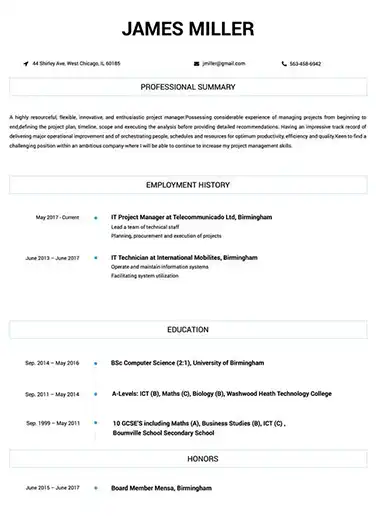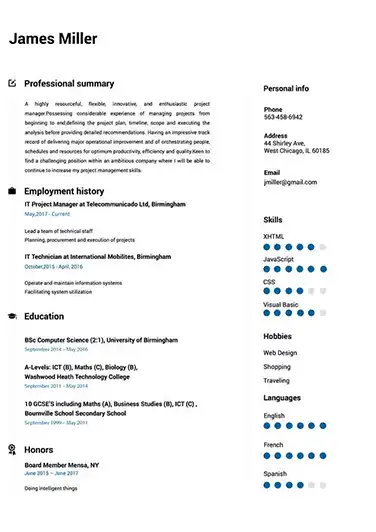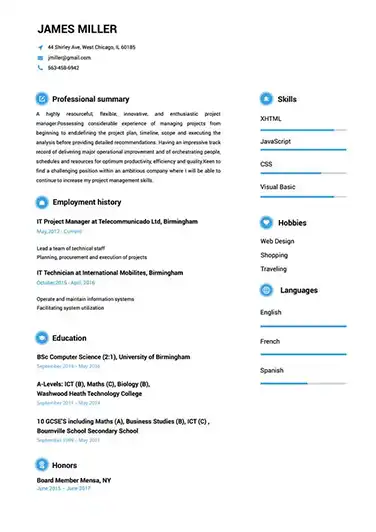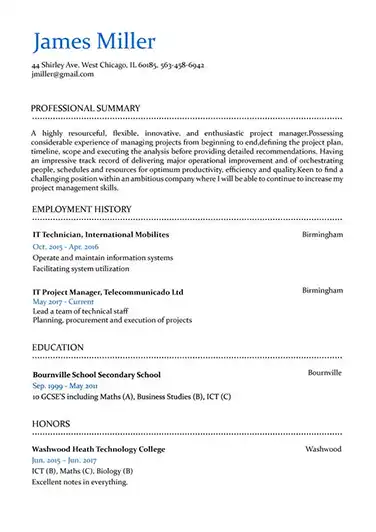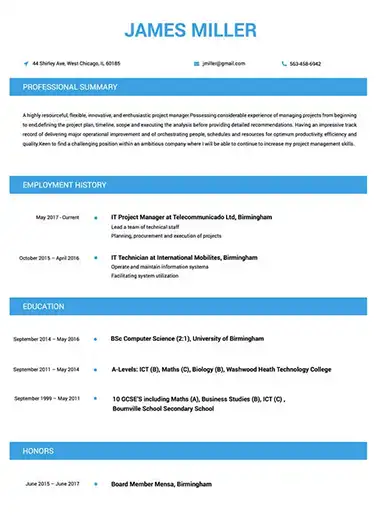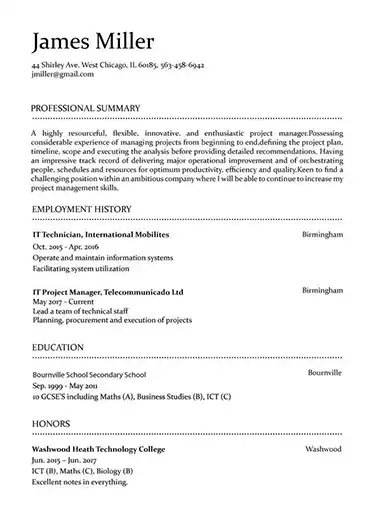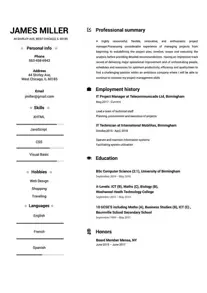 Use This Template
Use This Template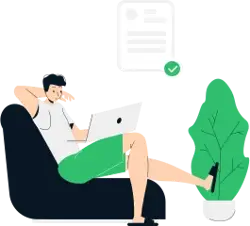
Build your resume in 15 minutes
Create an awesome resume that meets the expectations of potential employers with our selection of professional, field-tested resume templates.
graphic designer: Resume Samples & Writing Guide
earl.wright@aol.com
789-280-4623
Employment history
- Ensuring designs adhere to brand and style guidelines
- Managing projects from concept to completion
- Preparing presentations for clients
- Brainstorming ideas and concepts with team members
- Managing projects from concept to completion
- Editing and retouching photos and graphics
- Editing and retouching photos and graphics
- Creating digital assets for marketing and promotional campaigns
- Researching and staying up-to-date on design trends
Education
Skills
Do you already have a resume? Use our PDF converter and edit your resume.
parkerwalter82@outlook.com
844-773-8512
Employment history
- Managing projects from concept to completion
- Maintaining organized digital and physical design archives
- Ensuring all designs meet accessibility standards
- Editing and retouching photos and graphics
- Researching and staying up-to-date on design trends
- Managing projects from concept to completion
- Editing and retouching photos and graphics
- Researching and staying up-to-date on design trends
- Creating digital assets for marketing and promotional campaigns
Education
Skills
lewisgordon17@aol.com
827-839-4000
Employment history
- Researching and staying up-to-date on design trends
- Producing high-quality designs for digital platforms (websites, mobile, social media, etc)
- Creating digital assets for marketing and promotional campaigns
- Developing creative concepts and design solutions based on requirements
- Producing high-quality designs for digital platforms (websites, mobile, social media, etc)
- Ensuring designs adhere to brand and style guidelines
- Producing high-quality designs for digital platforms (websites, mobile, social media, etc)
- Developing creative concepts and design solutions based on requirements
- Creating digital assets for marketing and promotional campaigns
Education
Skills
young_simon@yahoo.com
823-774-2376
Professional Summary
Employment history
- Developing creative concepts and design solutions based on requirements
- Creating illustrations, logos, and other visual elements
- Working with printers, photographers, and other vendors
- Researching and staying up-to-date on design trends
- Editing and retouching photos and graphics
- Using software to create and manipulate images and graphics
- Preparing presentations for clients
- Collaborating with other designers, developers, and stakeholders
- Ensuring all designs meet accessibility standards
Education
Skills
jonathan_thompson@outlook.com
714-244-0879
Professional Summary
Employment history
- Managing projects from concept to completion
- Maintaining organized digital and physical design archives
- Creating digital assets for marketing and promotional campaigns
- Creating digital assets for marketing and promotional campaigns
- Ensuring designs adhere to brand and style guidelines
- Preparing presentations for clients
- Working with printers, photographers, and other vendors
- Using software to create and manipulate images and graphics
- Producing high-quality designs for digital platforms (websites, mobile, social media, etc)
Education
Skills
Not in love with this template? Browse our full library of resume templates
Graphic design is a fast-growing industry. And it’s no wonder why. Design is what drives a brand. From logos and business cards to packaging and marketing materials, graphic design plays a big role in a company’s competitive edge.
All that’s to say, you need a resume that puts your creative abilities into concrete words. And a resume design that goes above and beyond. You can’t expect to secure an interview with just any old resume template.
As a graphic designer especially, you need something spectacular—something that stands out.
In this article, we’ll cover what it takes to create an eye-catching resume. In short, that includes formatting instructions, how to add your online portfolio, and tools for easy resume setup. After reading, you’ll know:
- What recruiters look for in a graphic designer’s resume
- Which skills you should include and how you can demonstrate them with real-life examples
- Top technology and tools that a graphic designer should know
- How to include work samples (and how to pick which ones to include)
- Common mistakes in resume writing and what to avoid mentioning
- How to write a powerful personal statement, summary, or objective section
- What your resume should look like if you have little to no experience (hello, recent grads or career changers)
This guide will equip you with all the knowledge you need to create a top-notch resume. But first, let’s examine some graphic designer resume templates.
Graphic designer template examples
How to write an eye-catching graphic designer resume?
The key to an eye-catching resume is all in the design. It doesn’t matter how many years of experience you have or what companies you’ve worked for. If your resume isn’t designed well, it isn’t going to get noticed.
Don’t believe us? A recent study shows a recruiter spends an average of only seven seconds on each resume. Just seven seconds can make or break your chances of getting called in for an interview.
That statistic might seem surprising. But think about it. A recruiter doesn’t have time to read every resume word-for-word. They get hundreds, if not thousands. Instead, they go off of first impressions. They look at the overall design, creativity, and readability of your resume.
If it passes the test, they then skim the content for relevant skills and experience.
So, what exactly is it that makes a well-designed, creative, and easily-readable resume? It all starts with formatting.
How to format it
Formatting is one of the most important parts of your resume design. If things look wonky or unprofessional, it’ll get tossed in the trash.
A properly formatted resume usually includes easily-distinguishable sections. Here’s how we usually recommend breaking it down:
- Header section: Here, you should include your name and all relevant contact information. At the very least, you need your phone number and email (and both should be hyperlinked). As a graphic designer, you should also include a link to your online portfolio.
- Summary/objective section: The summary or objective section of your resume should follow the header. Keep it to 2-3 sentences and focus on what makes you unique. A vague summary or objective is a big no-no.
- Experience section: This is where you get to wow recruiters. Include any relevant positions and focus on including measurable results. This section is all about showing what kind of value you can bring to an organization.
- Skills section: This section can include both soft and technical or industry-specific skills. Think creativity, organization, Adobe Illustrator, InDesign, etc. For soft skills, try to include real-life examples.
- Education section: Include the school you went to and the area of study. You don’t need your graduation date or GPA. Recruiters rarely care about that. They don’t need to know when you graduated, just that you did.
As a general rule of thumb, your resume should never be more than one page in length. If you find yourself going over one page, you need to condense. It’s not easy; we know.
As a graphic designer, you probably know better than anyone the basic rules of design. But just to reiterate, here are some friendly reminders.
Firstly, use at least an 8 point font. Not everyone has perfect eye-sight. Be sure to review the PDF of your resume at a 100% zoom level. Ensure the text is easy-to-read. If you have to zoom in to easily read it, the text is too small.
Secondly, don’t underestimate the importance of white space. Keep one-inch margins and plenty of space between sections. This helps your resume look crisp and clean and makes it easier for a recruiter to skim it.
Thirdly—and you likely already know this, because you’re a graphic designer after all—but be sure to use different font weights and sizes for section headers and subheaders. It’s okay to be creative with font choice, but don’t pick one that’s too hard to read.
And fourthly, if you’re unsure how to list your experience, reverse-chronological is always a safe bet. Start with your most recent experience at the top and work your way backwards.
However, if you’re making a career change or applying for a new type of position, you can list your experience by relevance. Meaning, include the most relevant work at the top and the least relevant at the bottom.
Okay, now that you know how to format your resume, let’s move on to what recruiters will look for.
What recruiters will look for
There are certain things recruiters will look for in a graphic designer’s resume. Most importantly, they want to see that you can effectively demonstrate your design abilities.
A resume is important for anyone applying for a new job. But it’s especially important for graphic designers. You get to show your skill set on a sheet of paper. You can demonstrate your creativity and personal branding ability.
Your resume is a reflection of you. How do you want to present yourself?
Aside from that, they’ll look for experience that’s similar to the position you’re applying for. When writing the bullets for your experience section, try to quantify them whenever possible. For example:
- How many projects did you manage at any given time
- How many clients did you work with
- How much revenue did your designs help generate
In addition to relevant experience, recruiters will also look for software skills.
What skills to mention and how to do it correctly
Graphic designers need to be proficient in certain software and industry-specific tools. Listing them on your resume is crucial to securing an interview. Make a section specific to your skills and list them there. That way, they’re easy for a recruiter to find and quickly read through.
Here are top graphic design skills worth including:
- Adobe InDesign CC
- Adobe Illustrator CC
- Adobe Photoshop CC
- Dreamweaver
- CSS/ HTML
- Typography
- Sketching
- Photo-editing
- Creativity
- Color Theory
- Composition
- Project Management
When applying for a job, read through the list of required skills. Note all the ones you have in common and be sure to include them on your resume.
How to list different technologies and applications you have experience with
Listing technologies and apps you’re experienced with can be best demonstrated by including your level of experience. Whether through visual aids or with your words, a recruiter should know how proficient you are.
If you have the space, try to use graphics to show your level of proficiency. They’re pleasing to the eye and can help break up big chunks of text.
Example could be included here. Can do that when setting up article on the website.
How to include work samples and which ones to pick
Including your work samples can be a great way to set yourself apart from other candidates. And let’s face it. It’s a competitive world out there. You need to do everything in your power to show why you’re the best fit for a position. To do this, you need an online portfolio.
Your portfolio should be a collection that showcases your best work. So take the time to pick the pieces you’re most proud of. And don’t forget that recruiters will often look for someone with diverse work samples.
Include print, web and online projects, unless you’re applying for a position that is specific to only one of those areas. Not sure where to get started for your online portfolio?
Here are some top sites for graphic design portfolios:
Keep reading for more in-depth information on how to add an online portfolio.
What achievements to mention and how to do it correctly
Achievements are always a great addition to your resume. They demonstrate hard work and your ability to succeed.
Achievements worth mentioning include awards, rankings, and even certifications. Just be sure to only add achievements that are relevant to the job you’re applying for.
You qualified for the Boston Marathon? That’s incredible. But it doesn’t mean you’re a great graphic designer.
Here are some examples of achievements worth adding:
- Places your designs have appeared
- Featured artist awards
- Industry or company-wide awards
What to avoid mentioning
Knowing what to leave off of your resume is just as important as knowing what to include on it. Avoid any information that isn’t relevant. This includes jobs, skills, and anything that dates back to college (unless you’re a recent grad).
It’s really awesome you studied abroad in college—and we’re sure you gained valuable experience—but it isn’t exactly relevant if you’ve been in the workforce for 5+ years. If that’s the case, you can scrap it.
Keeping a resume to only one-page is hard. Don’t make it more difficult than it needs to be by including irrelevant information.
If it really comes down to it, you can always mention it in your interview.
Every word on your resume should serve a purpose. If it’s there just to fill space, remove it and replace it with something better.
And even though it takes time, you need to tweak your resume for each position you apply to. Match your skills with the required skills for the job posting. Edit your experience so it aligns with the day-to-day responsibilities of the position. Tweak your objective depending on the organization and its mission.
Just be sure to save a template of a generic resume. Instead of making revision after revision to the same file, start with your template each time. Otherwise, you’ll find yourself straying for your core experience. And that can become overwhelming fast.
How to write a resume objective (samples included)
A resume objective is an incredibly important part of your resume. In some ways, it’s sort of like a written elevator speech. A great one can go a long way. But a bad one can leave a bad first impression.
To write a great objective, you need to keep a few things in mind. In just a few sentences, you need to clearly communicate your career direction while also tailoring to the position you’re applying for.
The worst thing you can do is write something vague. Here are some samples.
Graphic designer seeking a position in digital design.
Compare this vague resume objective with the following objective:
Experienced graphic designer looking for an opportunity to bring brands to life online. I’m on a mission to make digital designs that stand out and leave a lasting impression.
The first sample is boring. A recruiter isn’t going to read it and think, “Wow. We need to hire this person.” And it’s probably true about nearly every graphic designer out there. It’s not unique. It’s not you.
The second one, however, is much more engaging. The candidate appears much more driven, with a clear career objective in mind. That alone will help this candidate stand out from the rest.
So, if there’s one thing to take from this, it’s to be specific. Think about what drives you and use that to create a compelling resume objective. If your objective could apply to anyone in your industry, you need to make it more unique.
How to write a resume summary (samples included)
A resume summary is a little different than a resume objective. Rather than talking about what you want to do next, a summary gives a quick background into your experience.
Here’s a sample of a great resume summary:
Hi! I’m Erin. I have worked in graphic design for 5+ years, specializing in brand packaging. I use every box, battle, and bag, every container, can, and canister to tell the story of a brand.
How to write a graphic designer resume with little or no experience
If you’re a graphic designer with little or no experience, you can still create a great resume. Everyone has to start somewhere. Follow these tips and tricks to ensure you’re a competitive candidate.
If you’re a recent grad or some who’s making a career change:
- Include relevant coursework
- Include internships
- Include any involvement in design-related student organizations
- Include any design certifications
- Include design work you did in class
- Include freelance work or side graphic design projects
Adding these to your resume will help a recruiter know you have a base knowledge in graphic design. They also show that you’re ready and willing to expand on your experience.
If you’re still having a hard time, try doing more freelance work. Sites like Upwork are always looking for beginner graphic designers. This way, you can start to build experience and have more projects to add to your portfolio.
And speaking of your online portfolio, let’s learn more about the right way to add it to your resume.
How to add an online portfolio to your resume
As a graphic designer, your portfolio is arguably the most important part of your application. Your resume matters, but your portfolio is what makes you a credible candidate. Remember that.
The best way to add your portfolio to your resume is through a link in your resume header. Avoid long and complex URLs. Keep it as short and simple as possible. In some cases, it’s best to invest in a custom domain and use your own website. This allows for the most control and customization.
To make a great online portfolio, follow these helpful tips.
Choose your best work and demonstrate your diverse skill set:
When it comes to portfolios, quality over quantity is really what matters. Select your strongest projects and make these the main focus of your portfolio. Try to include projects that illustrate your versatility. If you’ve worked on both logo design and print advertising, it’s best to include examples of both on your portfolio.
Pick a platform that best showcases your designs:https://www.wix.com/
Sites like Squarespace and Wix have templates specifically for creative portfolios. If you decide to use one of these platforms, we recommend purchasing your own custom domain. This way, you won’t have a long URL. A custom domain is much more professional-looking and will be worth it in the long run.
Plus, many of these sites offer month-to-month payment plans. You can always pay for the premium version to host your own domain while you’re job searching and then cancel once you’ve been hired.
Other top platforms include Behance, Adobe Portfolio and Foliolink. These are all graphic design-centered portfolio sites.
Whichever you choose, your portfolio should include a bio, visual aids, and descriptions of the project. Bonus points if you include the results your designs helped achieve (increase in brand awareness, increase in revenue, etc.)
Describe your creative process:
Each graphic designer has a unique creative process. And hiring managers want to see how it all comes together—from conception to completion.
Breaking down your creative process can give a recruiter a sense of your capabilities. For example, they might be unsure if you’re experienced enough to be a senior designer. That could all change once they read about how you led a complete rebrand for a Fortune-500 client. A portfolio is a great way to advocate for yourself.
Don’t be afraid to include freelance work or side projects.
Side hustles and freelance work are a fantastic way to show your ability to manage multiple projects at a time. They’re also a chance to illustrate more creative ideas you might not be able to show in your corporate day-to-day work.
How to make your resume stand out
Recruiters read hundreds, if not thousands, of applications for nearly every position they’re trying to fill. So if you don’t make an intentional effort to stand out, chances are - you probably won’t.
You’ll be just another paper in the stack and you surely won’t be called in for an interview. Here’s how to ensure that doesn’t happen to you.
Choose a template that demonstrates excellent typography, layout, and color theory skills.
You’re a graphic designer for crying out loud. In some ways, your resume is a test of your creativity and design skills. It shouldn’t look like an accountant’s resume. It should be bold and beautiful.
Describe your accomplishments, not your job responsibilities.
This is one of the most common mistakes people make when writing their resumes. Everyone knows what a graphic designer does, especially the person hiring for the position. They don’t just want to know what you do – they want to know how well you do it. What kind of value can you bring? How do you go above and beyond? How do your efforts contribute to success?
Worried your resume won’t stand out? We’re here to help.
How ResumeBuild tool could be utilized for an easy resume setup
Resume Build can be an excellent tool for easy resume set up. All it takes is three easy steps.
Step 1: Choose from more than 20 professionally-designed templates, with options for every industry.
Step 2: Import your content to show that you can talk the talk and walk the walk. If you’re not finding the right words, Resume Build has thousands of pre-written examples and resume samples.
Step 3: Download your resume and start sending it out. It’s really that easy!
So, there you have it. Three simple steps to creating a resume that will help you land your dream job. Build my resume now.
graphic designer Job Descriptions; Explained
If you're applying for an graphic designer position, it's important to tailor your resume to the specific job requirements in order to differentiate yourself from other candidates. Including accurate and relevant information that directly aligns with the job description can greatly increase your chances of securing an interview with potential employers.
When crafting your resume, be sure to use action verbs and a clear, concise format to highlight your relevant skills and experience. Remember, the job description is your first opportunity to make an impression on recruiters, so pay close attention to the details and make sure you're presenting yourself in the best possible light.
graphic designer
- Write content for websites and brochures.
- Designed professional logos, brochures, visiting cards.
- Designed websites front end with latest trend.
- Design UI and wireframe for mobile app .
graphic designer
- Prepares work to be accomplished by gathering information and materials.
- llustrates concept by designing rough layout of art and copy regarding arrangement, size, type size and style, and related aesthetic concepts.
- Prepares finished copy and art by operating typesetting, printing, and similar equipment; and purchasing from vendors.
- Maintains technical knowledge by attending design workshops; reviewing professional publications; and participating in professional societies.
graphic designer
- Make objects or characters appear lifelike by manipulating light, color, texture, shadow, and transparency, or manipulating static images.
- Gathered and organized information to plan advertising campaigns for a wide range of clients.
- Edited advertising videos/photographs for campaigns.
- Worked as part of a team with printers, copywriters, photographers, web developers, journalists and other designers.
graphic designer , photographer
- Develop graphics and layouts for product illustrations, company logos.
- Take pictures of individuals, Events, and small groups, either in studio or on location.
- Enhance, retouch, and resize photographs, using Adobe Products.
- Shoot, Edit Videos Using Adobe Products.
graphic designer
- As a part-timer graphic artist.
- Creating animation video as one of their learning material.
- Draw human characters.
- Photo editing.
graphic designer Job Skills
For an graphic designer position, your job skills are a key factor in demonstrating your value to the company and showing recruiters that you're the ight fit for the role. It's important to be specific when highlighting your skills and ensure that they are directly aligned with the job requirements, as this can greatly improve your chances of being hired. By showcasing your relevant skills and experience, you can make a compelling case for why you're the best candidate for the job.
How to include technical skills in your resume:
Technical skills are a set of specialized abilities and knowledge required to perform a particular job
effectively. Some examples of technical skills are data analysis, project management, software proficiency,
and programming languages, to name a few.
Add the technical skills that will get hired in your career
field with our simple-to-use resume builder. Select your desired resume template, once you reach the skills
section of the builder, manually write in the skill or simply click on "Add more skills". This will
automatically generate the best skills for your career field, choose your skill level, and hit "Save &
Next."
- Graphic Design
- Adobe Creative Suite
- Illustration
- Typography
- Layout Design
- Branding
- Color Theory
- Photography
- InDesign
- Photo Editing
- Logo Design
- Vector Graphics
- User Interface Design
- Web Design
- HTML
- CSS
- JavaScript
- Adobe Photoshop
- Adobe Illustrator
- Concept Development
- Motion Graphics
How to include soft skills in your resume:
Soft skills are non-technical skills that relate to how you work and that can be used in any job. Including
soft skills such as time management, creative thinking, teamwork, and conflict resolution demonstrate your
problem-solving abilities and show that you navigate challenges and changes in the workplace
efficiently.
Add competitive soft skills to make your resume stand-out to recruiters! Simply select
your preferred resume template in the skills section, enter the skills manually or use the "Add more skills"
option. Our resume builder will generate the most relevant soft skills for your career path. Choose your
proficiency level for each skill, and then click "Save & Next" to proceed to the next section.
- Communication
- Interpersonal
- Leadership
- Time Management
- Problem Solving
- Decision Making
- Critical Thinking
- Creativity
- Adaptability
- Teamwork
- Organization
- Planning
- Public Speaking
- Negotiation
- Conflict Resolution
- Research
- Analytical
- Attention to Detail
- Self-Motivation
- Stress Management
- Collaboration
- Coaching
- Mentoring
- Listening
- Networking
- Strategic Thinking
- Negotiation
- Emotional Intelligence
- Adaptability
- Flexibility
- Reliability
- Professionalism
- Computer Literacy
- Technical
- Data Analysis
- Project Management
- Customer Service
- Presentation
- Written Communication
- Social Media
- Troubleshooting
- Quality Assurance
- Collaboration
- Supervisory
- Risk Management
- Database Management
- Training
- Innovation
- Documentation
- Accounting
- Financial Management
- Visualization
- Reporting
- Business Acumen
- Process Improvement
- Documentation
- Relationship Management.
How to Improve Your graphic designer Resume
Navigating resume pitfalls can mean the difference between landing an interview or not. Missing job descriptions or unexplained work history gaps can cause recruiters to hesitate. Let's not even talk about the impact of bad grammar, and forgetting your contact info could leave your potential employer hanging. Aim to be comprehensive, concise, and accurate.
Employment history
- Using software to create and manipulate images and graphics
- Developing creative concepts and design solutions based on requirements
- Researching and staying up-to-date on design trends
- Maintaining organized digital and physical design archives
- Researching and staying up-to-date on design trends
- Developing creative concepts and design solutions based on requirements
- Brainstorming ideas and concepts with team members
- Creating digital assets for marketing and promotional campaigns
- Creating illustrations, logos, and other visual elements
Education
Skills
Provide your Contact Information and Address Year Gaps
Always explain any gaps in your work history to your advantage.
Key Insights- Employers want to know what you've accomplished, so make sure to explain any gaps using a professional summary.
- Adding extra details and context to explain why you have a gap in your work history shows employers you are a good fit for the position.
How to Optimize Your graphic designer Resume
Keep an eye out for these resume traps. Neglecting to detail your job roles or explain gaps in your career can lead to unnecessary doubts. Grammar blunders can reflect negatively on you, and without contact information, how can employers reach you? Be meticulous and complete.
colemaned47@outlook.com
959-909-5326
Professional Summary
Employment history
- Maintaning organised digitial an physical design archivs.
- Usin softwar to creat and manipulat imags and graphicss.
- Ensuring designes adhear to brandd and stylle guideliness.
- Ensuring all desgins meet accessibility standars.
- Workin with printer's, photograper's, and other vendor's.
- Usin software too creat and maniplate images an graphics.
Education
Skills
Include Job Descriptions and Avoid Bad Grammar
Avoid sending a wrong first impression by proofreading your resume.
Key Insights- Spelling and typos are the most common mistakes recruiters see in resumes and by simply avoiding them you can move ahead on the hiring process.
- Before submitting your resume, double check to avoid typos.
graphic designer Cover Letter Example
A cover letter can be a valuable addition to your job application when applying for an graphic designer position. Cover letters provide a concise summary of your qualifications, skills, and experience, also it also gives you an opportunity to explain why you're the best fit for the job. Crafting a cover letter that showcases your relevant experience and enthusiasm for the Accounts Payable role can significantly improve your chances of securing an interview.
Wright earl.wright@aol.com
789-280-4623
334 Cedar Avenue, Bokchito, OK
74726
IDEO
Chicago, Illinois
Esteemed Recruitment Team
I am a highly motivated Graphic Designer with 8 years of experience in Art & Creative & Design. I am excited to submit my application for the Senior Graphic Designer position at IDEO, where I believe my skills and expertise would be an excellent fit.
Throughout my life, I have been passionate about Illustration and have pursued opportunities to make a difference in this field. My experience in various areas, not just in Art & Creative & Design, has given me the opportunity to develop my skills in Problem Solving and Quality Assurance, which I am excited to apply to the role at IDEO. I am eager to work with a team that shares my values and to help your organization achieve its well determined goals.
I cannot stress enough how thrilled I am about the chance to join a team of like-minded individuals who share my values and passion for this amazing field. Thank you for considering my application and I hope for the chance to work together.
Best regards,
Earl Wright
789-280-4623
earl.wright@aol.com
Earl Wright
Showcase your most significant accomplishments and qualifications with this cover
letter.
Personalize this cover letter in just few minutes with our user-friendly tool!
Related Resumes & Cover Letters
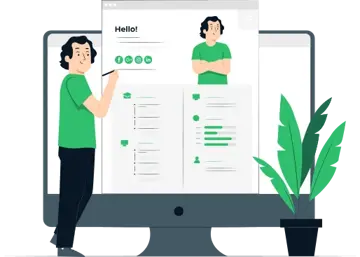
Build your Resume in 15 minutes
Create an awesome resume that meets the expectations of potential employers with our selection of professional, field-tested resume templates.

